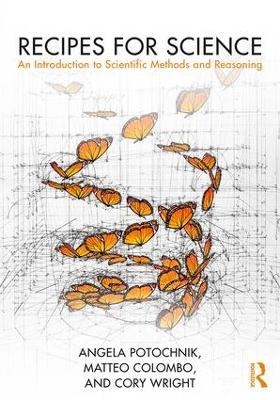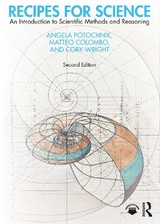
Recipes for Science
Routledge (Verlag)
978-1-138-92073-6 (ISBN)
Today, scientific literacy is an essential aspect of any undergraduate education. Recipes for Science responds to this need by providing an accessible introduction to the nature of science and scientific methods, reasoning, and concepts that is appropriate for any beginning college student. It is designed to be adaptable to a wide variety of different kinds of courses, such as introductions to scientific reasoning or critical thinking, philosophy of science, and science education. In any of these different uses, the book helps students better navigate our scientific, 21st-century world.
Key Features
Contemporary and historical examples of science from many fields of physical, life, and social sciences.
Visual aids to clarify and illustrate ideas.
Text boxes to explore related topics.
Plenty of exercises to ensure full student engagement and mastery of the information.
Annotated 'Further Reading' sections at the end of each chapter.
Final glossary with helpful definitions of key terms.
A companion website with author-developed and crowdsourced materials, including syllabi for courses using this textbook, bibliography of additional resources and online materials, sharable PowerPoint presentations and lecture notes, and additional exercises and extended projects.
Angela Potochnik is Associate Professor of Philosophy and Director of the Center for Public Engagement with Science at the University of Cincinnati, USA. Matteo Colombo is Assistant Professor in the Tilburg Center for Logic, Ethics, and Philosophy of Science, and in the Department of Philosophy at Tilburg University, the Netherlands. Cory Wright is Professor of Philosophy and Director of Graduate Studies at California State University Long Beach, USA.
List of Figures; Acknowledgements; Introduction: Science and Your Everyday Life; Chapter 1. What is Science?; 1.1 The Importance of Science; 1.2 Defining Science; 1.3 Recipes for Science; Chapter 2. Experiments and Studies; 2.1 Experiment: Connecting Hypotheses to Observations; 2.2 The Perfectly Controlled Experiment; 2.3 Experimental and Non-Experimental Methods; Chapter 3. Models and Modeling; 3.1 Models in Science; 3.2 Varieties of Models; 3.3 Learning from Models; Chapter 4. Patterns of Interference; 4.1 Deductive Reasoning; 4.2 Deductive Reasoning in Hypothesis-Testing; 4.3 Inductive and Abductive Reasoning; 5. Statistics and Probability; 5.1 The Roles of Statistics and Probability; 5.2 Basic Probability Theory; 5.3 Descriptive Statistics; Chapter 6. Statistical Inference; 6.1 Generalizing from Descriptive Statistics; 6.2 Using Statistics to Test Hypotheses; 6.3 A Different Approach to Statistical Inference; Chapter 7. Causal Reasoning; 7.1 What is Causation?; 7.2 Testing Causal Hypotheses; 7.3 Causal Modeling; Chapter 8. Explanations, Theories, and Values; 8.1 Understanding the World; 8.2 Theories and Theory Change; 8.3 Science, Society, and Values; Glossary; References; Index
| Erscheinungsdatum | 15.09.2018 |
|---|---|
| Zusatzinfo | 22 Tables, black and white; 20 Line drawings, black and white; 20 Halftones, black and white |
| Verlagsort | London |
| Sprache | englisch |
| Maße | 178 x 254 mm |
| Gewicht | 840 g |
| Themenwelt | Geisteswissenschaften ► Philosophie ► Logik |
| Geisteswissenschaften ► Psychologie ► Allgemeine Psychologie | |
| Geisteswissenschaften ► Psychologie ► Verhaltenstherapie | |
| Naturwissenschaften ► Biologie | |
| ISBN-10 | 1-138-92073-8 / 1138920738 |
| ISBN-13 | 978-1-138-92073-6 / 9781138920736 |
| Zustand | Neuware |
| Informationen gemäß Produktsicherheitsverordnung (GPSR) | |
| Haben Sie eine Frage zum Produkt? |
aus dem Bereich



